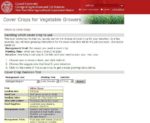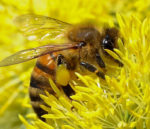The educational materials listed on this page are about Agroecosystems.
What is agroecology? An agroecosystem is any ecosystem managed primarily for the production of food, fuel or fiber. Agroecology is the study of agricultural ecosystems and the natural resources required to sustain them. Ecological farming requires producers to work within their environmental limitations and use technology to address ecosystem constraints, and gain a competitive edge in the marketplace. Agroecological management enhances the sustainability of agricultural ecosystems by trying to work with the ecological relationships and processes within the broader ecosystem. Agroecology promotes the conservation of soil and organic matter, as well as other resources such as energy and water. Agroecosystems reflect diversity in the landscape, through crop/livestock integration and in marketing. They also seek to strengthen farmers and their communities by developing local agricultural knowledge and building ties among farmers and their consumers.
Key practices include the use of cover crops, crop rotation, reduced tillage, buffer strips, rotational grazing, seed saving and planting heirloom crops, and pasture and rangeland management.
SARE's Systems Research for Agriculture provides helpful tips for farmers or researchers interested in agroecology research. SARE agroecology books such as Building Soils for Better Crops, Crop Rotation on Organic Farms and Managing Cover Crops Profitably can help producers put agroecology in action. Rangeland Management Strategies features guidance on improving range for grazing. The SARE book Manage Insects on Your Farm: A Guide to Ecological Strategies describes how to control insect pests using a systems-level, agroecological approach.
Showing 1-3 of 3 results
How Alive is My Soil?
This guide presents soil testing methods that can be performed in the field by farmers, gardeners, or anyone who desires to understand and appreciate soil from a different perspective. While these tests aren’t intended to be a replacement for sending soil to a lab, they can be considered complementary to annual or biannual lab analysis.

New York Cover Crops Decision Tool
This is an online tool to help you quickly narrow the choices of cover crop for your situation. In a few seconds, you will have growing instructions for the cover crop that will do the job you need. Access the Cover Crops Decision Tool now. It is designed for the soil, climate, cropping practices and […]

Native bees and flowering cover crops
While managed colonies of European honey bees are most frequently used for crop pollination, wild or native bees commonly provide the same pollination services for ‘free’ without the costs of renting or maintaining honey bee hives.